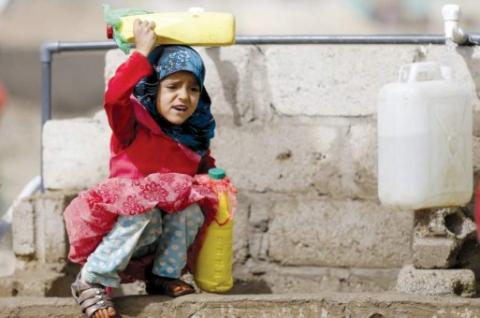Escalating Yemen conflict can't be ignored


By By Ben Rich *
The escalating conflict in Yemen over the past week marks a significant turn for the local war that could also have implications for the wider politics of the region, writes Ben Rich.
The last few days has seen an important escalation in the Yemeni conflict, with an amphibious ground invasion undertaken by the Gulf Co-operation Council (GCC) coalition launching offensive operations against Houthi rebels.
Although several sources have picked up on these dramatic events, the majority of the mainstream media appears to either be unaware of it, or have downplayed its significance for the local war and the wider geopolitics surrounding it.
The UAE lands in Aden
On August 2, a number of sources noted the presence of a substantial, non-indigenous force relieving besieged pro-government Yemeni forces in the southern city of Aden. On August 3 a large column moved rapidly north from the city along Wadi Tuban to seize the strategically important al-Anad airbase from Houthi fighters. Initial reports mistakenly identified the newcomers as Saudi military. A closer inspection of their equipment revealed them as regulars from the United Arab Emirates, with claims of 1500 troops mounted in hundreds of armoured vehicles fighting alongside local Yemenis.
The size of the force and its extensive use of heavy armour, indicates the contingent had deployed amphibiously, rather than via airlift, as in previous GCC activities around Aden. This newly demonstrated capacity for power projection by the small Gulf state remains unprecedented and the largest operation of its type in the region since the liberation of Kuwait in 1991.
Although some are portraying the victories over the past few days as primarily those of local anti-Houthi forces, there should be no illusions that the shift in polarity is primarily thanks to the external intervention. Although the coalition air campaign had certainly slowed Houthi activities, it failed to empower elements that are supportive of president Abdrabbuh Mansour Hadi to roll back gains made by the rebels over the past months.
The arrival of the large mechanised force has rapidly tipped the scales in the lowlands of Aden and its surrounding territories against the Houthis, with the militants ill-equipped to fight it over open ground. The question remains, will UAE troops press north towards Houthi-held Sana'a?
The Saudi push south
Riyadh has taken the leading role in the coalition throughout operations "decisive storm" and "restoring hope" and the absence of Saudi forces in the Aden landfall was a notable departure from their behaviour, especially given the 150,000 troops that have been arrayed along the Saudi-Yemeni border since March. The reason for this inaction now appears to be becoming clear, with a large Saudi ground force pushing south-west into Yemen from the al-Wadiya crossing. Their target: the former Yemeni capital, Sana'a.
Although the UAE move into Aden is certainly a blow against the Houthis, Sana'a has remained in Houthi hands since 2014. Unless the coalition is able to dislodge the rebels from the city, it will remain a powerful card in their deck in any future negotiations.
With large-scale Saudi military movement south and an intensification of airstrikes in the adjacent al-Jauf province, it appears Riyadh is dead set on this objective.
But unlike the flatlands around Aden, the mountains in northern Yemen and surrounding Sana'a are extremely rough terrain, ill-conducive to the rapid armoured advances seen at al-Anad. In addition, the Houthis have a long, well-earned reputation as tough mountain fighters able to overcome technologically and numerically superior opponents on their home turf. While the al-Wadiya route allows for the circumventing of the formidable Sadaa Mountains, to reach Sana'a by land the Saudis will eventually be forced into terrains that favours the Houthis.
A Newly Assertive GCC
Perhaps the most important and underreported aspect of the invasion are its ramifications within the wider regional Cold War between Riyadh and Iran. As some analysts have noted, the reign of Saudi King Salman is already demonstrating an increasingly emboldened Saudi state and GCC, willing to aggressively defend their own national interests, rather than rely on countries like the US for their security needs.
For many in Saudi policy circles, the rise of the Houthis has been perceived as the latest move against them by Iran in a wider geopolitical "Great Game" centred around hegemony in the Gulf. Debates over the empirical validity of this view are largely academic, as it pervades the Saudi security establishment. Instead of attempting to defeat this perceived threat through proxy, Salman has decided to break with tradition and crush it outright with the hard power the Kingdom has invested so heavily in over the past 25 years.
But while under King Abdullah such fears and paranoia remained largely contained, Salman's administration appears worryingly confrontational and willing to make gambles his predecessor largely eschewed. As one analyst has put it, "the king has embarked on the most ambitious foreign policy project in the kingdom's modern history". Indeed, the Yemen operation appears to have shattered the longstanding policy of non-intervention that has been embraced by the GCC since its inception and struck an important and confounding precedent in the region's byzantine security equation.
*Ben Rich is a PhD Scholar at the School of Political and Social Inquiry at Monash University.

Yemeni officials on Monday condemned arrests and prosecutions by the Iran-backed Houthi militia directed against media, journalists and celebrities…

Yemen's warring parties are gearing up for new waves of conflict in 2023 amid a lack of decisive steps towards sustainable peace, adding to the suf…

The UAE will help to recruit doctors and deliver crucial supplies for hospitals in Yemen under a major healthcare drive. The Khalifa bin…